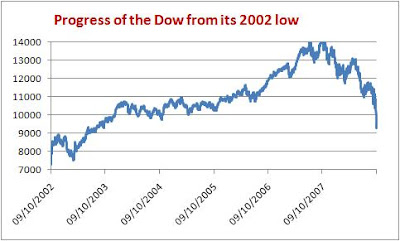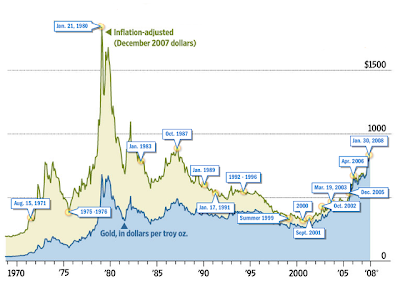Jim in San Marcos envisages eventual interest rate rises worldwide, to 10-15%. Commenting on the preceding post, Nikolay disagrees and James asks the question. I'm trying to understand the situation, like everyone else, so I'll have a go at thinking aloud:
Nikolay makes the point that people are becoming more concerned about the return OF their money, than the interest ON their money. So money-holders will limit demand for their cash by being picky about who they'll lend it to; control by quality screening, not by price.
Also, if people who habitually live on credit become frightened - and I think they are - then they will start trying to live within their means.
And discretionary expenditure could be reduced and/or redirected, not necessarily towards the cheapest end. I was listening to someone in the UK fashion industry on R4 yesterday, and they said far from everyone turning to Primark, the trend was to buy better quality, less of it, and make it last longer. Note that it's budget airlines like XL (competing on price) that are in danger of going down - they don't have much "fat to survive the winter".
From another angle, as the supply of cash and credit is dwindling, so are prices of houses and many other big-ticket items - look at the deals on cars and computers.
So it's possible to imagine that the contraction in credit may be approximately matched by a contraction in demand for credit, at least for a time. Bankruptcies and house repossessions will burn off a lot of debt, so we'll see a lot of ordinary people cleaned out and possibly more bank failures, especially as (in response to reduced expenditure) unemployment grows.
Thus we could see a recession in which the government tries to stimulate consumer demand by cutting interest rates - and this may not work, because many won't want (or be able to afford) to take on debt at any price; and those who do have cash and are watching prices fall, will hang off, waiting for further falls - as happened in Japan.
But Jim himself has acknowledged that rates may be cut in the short term. What about the longer term?
More unemployment, lower profits etc will shrink the tax base and increase the benefit burden. The budget won't balance without cuts in the public pay sector (= even less tax, even more benefits) or more government borrowing - I don't see how we in the UK could be taxed much more. So there's a danger that while consumer debt leads the way into recession, increased government demand for debt (and increased concern about government creditworthiness) may then lead the way to higher interest rates on State bonds.
When the State has more dependents, it will also find that not everything is going down in price. Food and fuel are must-haves, so benefits will have to be increased to cover the cost of such items. There will be more poor, and they will each need more. And the government will have to borrow more.
Or start devaluing the currency. Then all bets are off.
So here's a scenario: interest rates kept low, or cut; then government borrowing rises, while the economy burrows into a slump; then the
real "credit crunch": the moment when the government, like an ad-man under pressure, needs a feelgood episode and, despite having sworn off it for life, reaches for the booze or the white powder, in this case inflation.
More and more,
Michael Panzer's dire financial drama seems plausible.
Marc Faber recently said that the US needed $5 trillion to resolve the crisis, i.e. 7 times more than the amount approved by Congress. Britain's bailout fund is proportionately 7 times greater, and so, crippling cost to the taxpayer aside, maybe it could work.







 In other words, if America had no such debts, she would have $1.45 trillion more per year to spend on other things.
In other words, if America had no such debts, she would have $1.45 trillion more per year to spend on other things.
 Somebody please put me right and/or direct me to authorities and information sources.
Somebody please put me right and/or direct me to authorities and information sources.


 We saw them as Professor Brian Cox tootled along through the circular cavern, didn't we? D:Ream on. What we saw was a CGI loop, entirely familiar to computer games players. Beneath this illusory overlay is footage of working, sleeping and recreational facilities, water filters, air recycling machinery, food stores and all the rest. Like
We saw them as Professor Brian Cox tootled along through the circular cavern, didn't we? D:Ream on. What we saw was a CGI loop, entirely familiar to computer games players. Beneath this illusory overlay is footage of working, sleeping and recreational facilities, water filters, air recycling machinery, food stores and all the rest. Like 